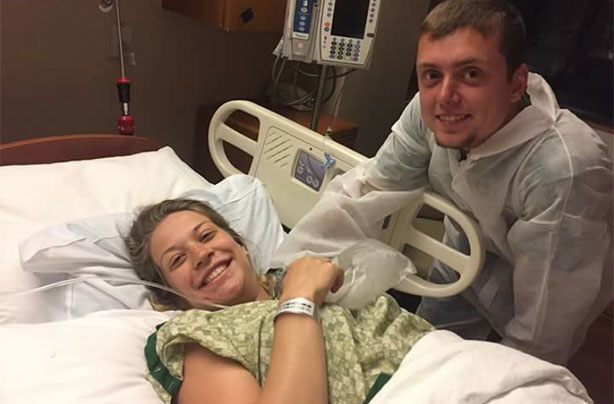'If you have doubts, go in' Mum shares emotional Facebook post about the importance of trusting your instincts
'You know your body and what's normal for your baby'

A new mum has stressed the importance of following your instincts after an emergency C-section at 38 weeks saved her baby's life.
19-year-old Ayla Heller took to her Facebook page to share the harrowing ordeal of delivering her first baby two weeks early, after a day of not feeling any kicks.
https://www.facebook.com/ayla.vogel/posts/1467568039987869
'Pretty early that morning I had already noticed Maddy wasn't kicking around very much but had assumed she was having a less active day (which happened regularly),' she wrote on the social media platform. 'Dalton put his hand on my belly and asked if she had been kicking. I became uneasy as I realized she still hadn't moved all day.'
'Half of everything I read [online] said go [to hospital] immediately, and the other half said that babies run out of room to kick.'
In the end, Ayla and her boyfriend Dayton consulted Ayla's mum, who urged her to go to hospital as soon as possible. Once there, she was hooked up to monitors - then her midwife arrived, and wasted no time in explaining things were not looking good, and an emergency caesarean was necessary.
https://www.facebook.com/photo.php?fbid=1471028352975171&set=picfp.100002040616221.1007811592630185&type=3&theater
GoodtoKnow Newsletter
Parenting advice, hot topics, best buys and family finance tips delivered straight to your inbox.
'We were informed that if there was life threatening problems with Maddy, which they believed to be a pretty high chance,' Ayla continued.
'I was given my spinal and before they could even get Dalton in the room they began the delivery. She came out fine and cried a little bit, but she needed oxygen.'
https://www.facebook.com/photo.php?fbid=1043893785688632&set=picfp.100002040616221.1007811592630185&type=3&theater
'After about 40 more minutes, Maddy and I were released back to our original room,' she continued. 'There I was informed that my placenta had aged prematurely, was calcified, and had basically given up.'
'This had caused Maddy to not be receiving as much oxygen or food as she needed. This was causing her to try to preserve her energy, which is why she had stopped moving. This also caused her to have low blood sugar upon arrival so she needed to be hooked up to a glucose drip IV her first few days.'
Ultimately, Ayla and Dalton wanted to use their experience to warn other expectant parents to always trust their instincts – and the post has done just that, with nearly 20,000 shares and thousands of comments.
'The point in me sharing this is to let anyone else know that things like this DO happen,' she implores. 'You know your body and what's normal for your baby. And BABIES DON'T RUN OUT OF ROOM!! that was the common response I kept seeing. Babies will always kick weather there's much room or not. IF YOU HAVE DOUBTS, GO IN. GO IN. GO IN. GO IN!!!'
'Always be safe rather than sorry. Because I almost didn't. I almost waited till morning to see if anything changed. And had I done that, I wouldn't have my love.'
Trusted, informative, and empathetic – GoodToKnow is the ultimate online destination for parents. At GoodtoKnow, our mission is 'simple': we're trying to make sense of parenthood. On the site, you'll find everything you need for a happy, healthy family life. Our huge archive of content includes more than 18,000 articles and 1,500 how-to videos. These include expert-backed advice features on parenting, dealing with relationship changes after having a baby, self-care for mums and managing your family finances. We also feature tried-and-tested product reviews and buying recommendations for every stage of family life - from prams and Moses baskets to birthday gifts and top toys.